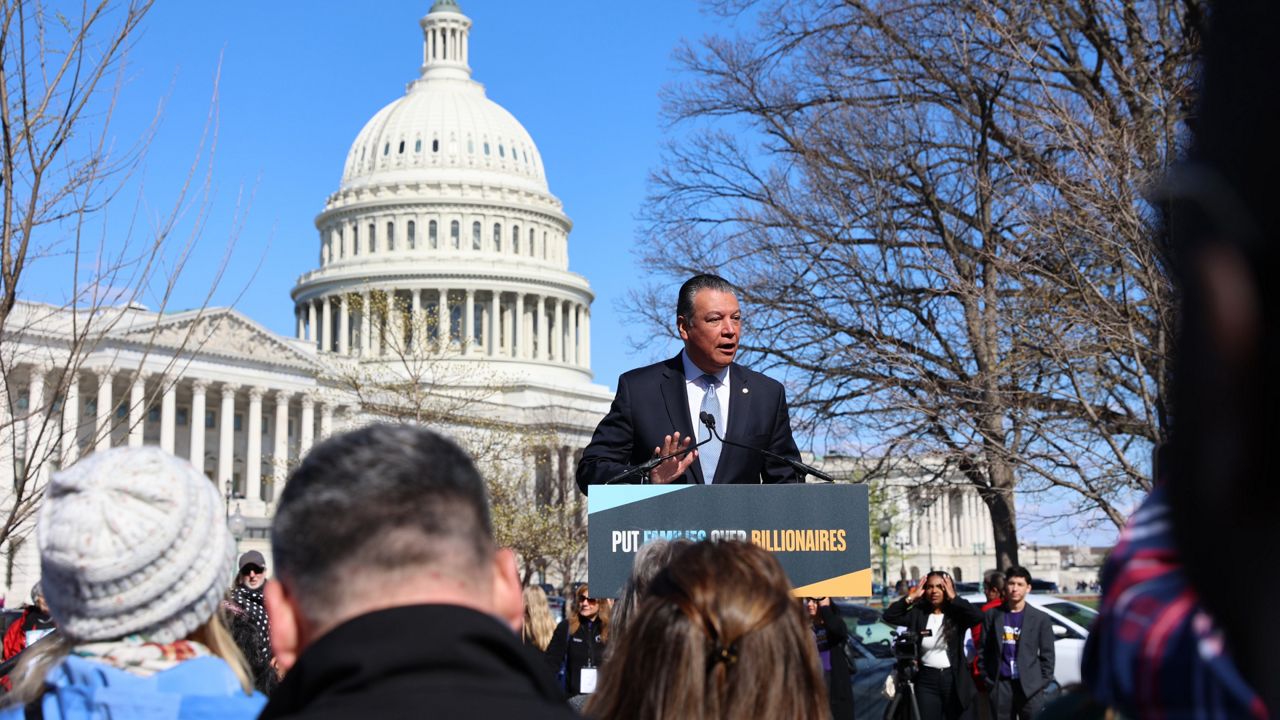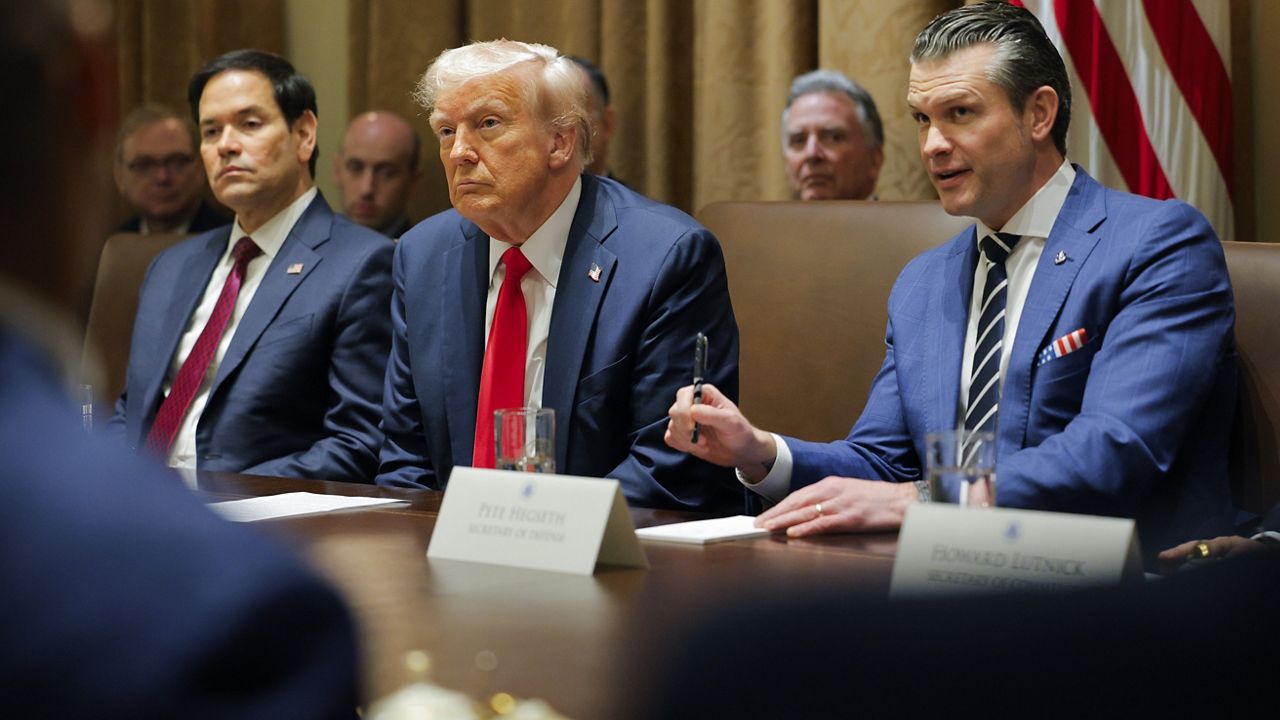The White House said Wednesday that the Biden administration has helped broker an agreement for the Port of Los Angeles to become a 24-hour, seven-days-a-week operation, part of an effort to relieve supply chain bottlenecks and move stranded container ships that are driving prices higher for U.S. consumers.
In remarks at the White House later Wednesday, President Joe Biden said that the day's announcement "has the potential to be a game changer."
"Today we have some good news," Biden said at the White House Wednesday. "We're going to help speed up the delivery of goods all across America."
"After weeks of negotiation and working with my team, and with the major union, retailers and freight movers, the Port of Los Angeles announced today that it's going to begin operating 24 hours a day, 7 days a week," Biden said. "This follows the Port of Long Beach's commitment to 24/7 that was announed just weeks ago."
Ports in Los Angeles and Long Beach, California, account for 40% of all shipping containers entering the U.S., Biden said Wednesday, highlighting them as some of the largest in the world. As of Monday, there were 62 ships berthed at the two ports and 81 waiting to dock and unload, according to the Marine Exchange of Southern California.
The supply chain problem is tightly linked with the broader challenge of inflation confronting the nation.
Biden said that "most of the leading countries in the world" already operate on a 24/7 system, except for the U.S., "until now."
"This is the first key step toward moving our entire freight, transportation and logistical supply chain nationwide to a 24/7 system," Biden said, before explaining the significance of the move.
"By staying open 7 days a week, through the night and on the weekends, the Port of Los Angeles will open over 60 extra hours a week," Biden said, noting it will almost double the amount of hours it is open for business from earlier in 2021. Biden also added that it will increase workers' hours, as well as expedite shipping times.
Biden said it was "critical" to increase night hours for movement of goods "because highways are less crowded in the evening, at night," citing that during off-peak hours, cargo can leave the port "at a 25% faster pace" than during the day.
The president said that the country will also need private sector companies to help move the goods – and, to that end, he made major announcements about commitments from companies like Samsung, Target, Walmart and Home Depot, as well as shipping companies UPS and FedEx.
"Today Walmart, our nation's largest retailer is committing to go all in on moving its products 24/7 from the ports to their stores nationwide," Biden said. "Specifically, Walmart is committing as much as 50% increase in the use of off peak hours over the next several weeks."
Biden said that Samsung, Home Depot and Target "to ramp up their activities to utilize off peak hours at the ports," adding: "Their commitment to go all in on 24/7 operations means that businesses of all sizes will get their goods on shelves faster and more reliably."
Biden was joined at the White House by the directors of both ports, as well as the head of the International Longshore and Warehouse Union. Before his speech, the president held a virtual roundtable with the heads of Walmart, FedEx Logistics, UPS, Target, Samsung Electronics North America, the Teamsters Union and the U.S. Chamber of Commerce, among other groups.
"All of these goods won't move by themselves," Biden said. "For the positive impact to be felt all across the country and by all of you at home, we need major retailers who ordered the goods and the freight movers who take the goods from the ships to factories and stores to step up as well."
The president said that if private sector companies do not step up, "we're going to call them out and ask them to act," not ruling out federal action in order to do so.
"I want to be clear, this is across the board commitment to go into 24/7," Biden said. "this is a big first step in speeding up the movement of materials and goods through our supply chain, but now we need the rest of the private sector chain to step up as well. This is not called a supply chain for nothing."
"Strengthening our supply chain will continue to be my team's focus,” Biden continued. “If federal support is needed, I will direct all appropriate action."
"Now if the private sector doesn't step up, we're going to call them out and ask them to act, because our goal is not only to get through this immediate bottleneck, but to address the long-standing weaknesses in our transportation supply chain that this pandemic has exposed," Biden continued.
Biden also used the opportunity to call for Congress to pass his $1 trillion bipartisan infrastructure bill, which passed the Senate earlier this summer but is stalled in the House amid ongoing negotiations on a larger social spending plan. The bill, which received large bipartisan support, would invest billions in port infrastructure, as well as make investments in freight rail, roads and bridges.
"In order to be globally competitive, we need to improve our capacity to make things here in America, while also moving finished products across the country and around the world," Biden said. "We need to think big and bold. That's why I'm pushing for a once-in-a-generation investment in our infrastructure and our people."
"Let me be clear, we're proposing to make the biggest investment in ports in our history," Biden added. "The bill would also make investments in our supply chains and manufacturing and strengthening our ability to make more goods from the beginning to end right here in America."
"Never again should our country and our economy be unable to make critical products we need because we don't have access to materials to make that product," Biden pledged.
Willie Adams, the president of the International Longshore and Warehouse Union, told Spectrum News his union's members are ready to answer the president's call, and he is not worried about worker burnout: "Our members are trained and ready to go to work. We’ve had no worker shortages."
Republican lawmakers have frequently blasted Biden’s $1.9 trillion coronavirus relief package for fueling higher prices. A recent analysis issued by the investment bank Goldman Sachs estimates that “supply-constrained goods” account for 80% of this year’s inflation overshoot, yet the political criticism continues to sting as housing and oil prices add to inflationary pressures.
Senate Minority Leader Mitch McConnell, R-Ky., has made inflation one of his central criticisms of Biden, signaling a key Republican talking point for the 2022 midterm elections – a sign that getting prices under control could be essential for Democrats trying to maintain or expand in next year’s elections.
“The Democrats’ inflation is so bad that even though the average American worker has gotten a multiple-percentage-point pay raise over the last year, their actual purchasing power has been cut,” the Kentucky Republican said in a Senate floor speech last week. “Even dollar stores are having to raise their prices. Just ask any American family about their last few trips to the supermarket, the gas station or the toy store. Heaven forbid if they’ve had to participate in the housing market or the auto market anytime lately.”
The Biden administration has argued that higher inflation is temporary. Yet the supply chain issues have persisted months after the economy began to reopen and recover after vaccines lessened many of the risks from the pandemic.
Economists expect that Wednesday’s consumer prices report will show that prices climbed 5.3% from a year ago, significantly above the Federal Reserve’s 2% target.
The Associated Press contributed to this report.











